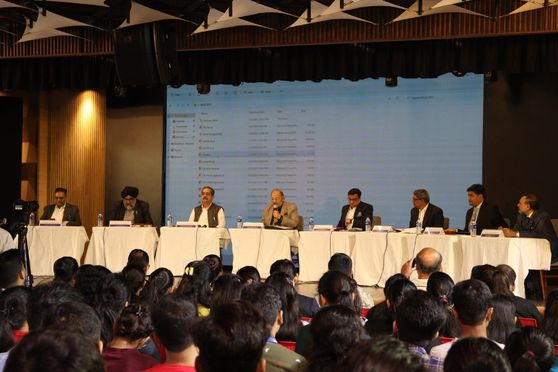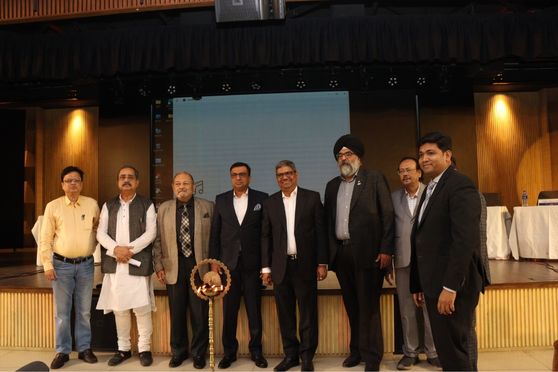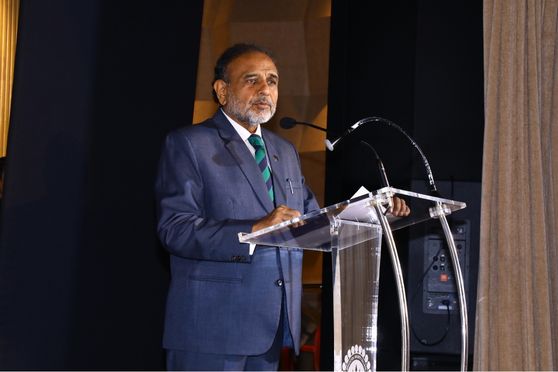Bhawanipur Education Society College organised Seminar on Union Budget 2023-24


The Department of Commerce (UG and PG) and the Department of Business Administration (BBA) of the Bhawanipur Education Society College conducted a Seminar on “Union Budget 2023-24” on 6 February, 2023 at the Concept Hall, of the main campus of the College. Students from various departments such as BBA, B.Com and M.Com registered for the event in large numbers. The registration began at 1:30 pm and in less than half an hour it had a packed house.
The Seminar began with Prof Dilip Shah, Dean of Student Affairs welcoming the gathering formally. He introduced the Dignitaries, Moderator, and Faculty, and invited them to light the lamp. He then ushered the Speakers and Moderator onto the stage to take their seats. Thereafter Prof. Shah handed over the proceedings of the event to the Moderator, Dr. Suman K Mukerjee, Director General, BESC.
Dr. Mukerjee explained the areas to be covered by the speakers based on their expertise. He shared the key points of the Budget 2023-24 highlighting the highest growth rate India had achieved overall in developing nations. He said that the Budget truly integrated the economy and had the vision to link the major areas of economic activities - on the Rural front and the MSME Areas. It addressed issues concerning tribal groups, SCs, STs, Backward classes, and OBCs and in that way was a “Bharat jodo'' economic plan. He reiterated that contrary to popular belief, the Indian economy is in fact performing fairly well globally as compared to many other developing nations that have moved from resilience to resurgence and Fiscal consolidation to counter-cyclical fiscal policy stressing on IRGD (Interest Rate- Growth Rate Differential). He referred to it as a document that, while outlining the government's revenue and expenditure for the upcoming fiscal year, sets the direction for inclusive economic growth and development through social overhead capital.
Dr. Ashok K Lahiri (Economist, Former Chief Adviser member of the 15th Finance Commission) spoke extensively on the budget thrust and the importance of the primary deficit. He also spoke about growth and stability, Fiscal prudence, and sustainability of debt. He also explained that “all receipts are not revenue” and interest payments are not expenditures.

Next, CA Lion A.P. Singh (Chartered Accountant and Vice President of Lions Club International) spoke on the “Amrit Kaal” which refers to the next 25 years up to 2047. He spoke on what this budget will provide and the importance of developing the infrastructure, health, education, and family welfare in India. He also spoke about the fiscal deficit and the danger it poses to our economy. He concluded that the future would depend on the youth and their ability to make rational decisions.
CA Harish Agarwal (Managing Partner, EY, and COO for the consulting service line of EY India) was optimistic about where we can expect India to be in the next 25 years. He delved into the intricacies of foreign investments and the modified personal Income tax regime. He also spoke of the need to increase the women's participation rate and the vital role women need to play in promoting Indian economic growth and not just attending to domestic issues.
Next, CA Dinesh Agarwal, (Partner EY, India) spoke briefly about the effect of Direct taxes and rationalisation of measures in the country. He explained the difference between the old and the new Personal Income Tax regime and the rationale behind it.
CA Avisekh Jaiswal, (Partner EY, India), spoke on the concepts of Indirect taxes. He mentioned the importance of GST as a contribution to Indirect tax, Central Excise Duty, and Customs Duty which are as yet concurrently in vogue. It is a matter of time before all Indirect taxes are integrated under one head.
CA Arun Agarwal (Chartered Accountant and Partner, K N Jain) spoke on the signalling and thrust of the Budget. Being an expert on Service Tax, he gave his thoughts on the relevance of input tax credit in the current Budget.

After all the panellists had delivered their presentations, the Moderator quizzed them on the reduction in MNREGA expenditure, the relevance of Farm Bills when rural development is crucial, and Health, education, and other socio-economic indicators. Thereafter, some questions were invited from the audience, and it was heartening to see students and faculty exhibiting a great deal of curiosity to ask very relevant questions. The speakers aptly answered the questions with a lot of interest and enthusiasm.
During the penultimate part of the session, the Moderator summed up the proceedings through some interesting insights. Thereafter, the Panellists were felicitated by the designated Heads of both the Departments of Commerce and Management.
The event finally concluded with a vote of thanks which was delivered by Dr. Subhabrata Ganguly, Teacher in Charge, BESC. He congratulated the Departments of Commerce (UG and PG) and Business Administration for successfully conducting the Panel Discussion and thanked Dr. Tridib Sengupta and Prof. Saspo Chakraborty who were the Convenors and Joint Convenors respectively. He also thanked the Event coordinators Ms. Paridhi Agarwal and Ms. Arundhati Mazumder for their networking and organising the event successfully.
The faculty members of both the Departments of Commerce and Management worked in tandem to make the event a memorable one. The student volunteer team too helped in ensuring the auditorium was filled to capacity and maintained discipline and decorum.